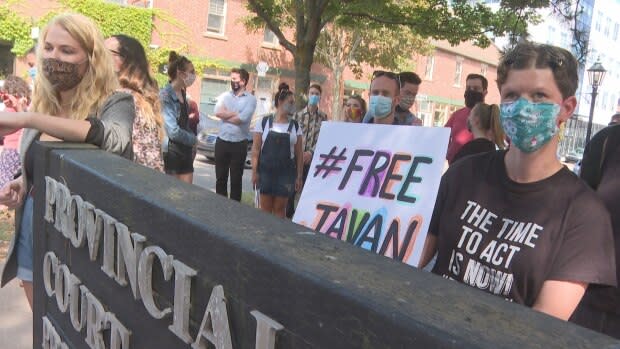Why getting non-profit status would allow this BIPOC group to do more for its community
Danté Bazard and Sobia Ali-Faisal meet in their small office in downtown Charlottetown, focused on their work. There's a lot to do.
Bazard and Ali-Faisal are two of the co-founders of BIPOC USHR, an advocacy group which stands for Black, Indigenous, People of Colour United for Strength, Home, Relationships.
When pandemic restrictions started coming into effect, the group worked to raise money for international students who were struggling financially because of COVID-19 and didn't have access to government aid.
Now, after successfully raising thousands of dollars to support dozens of those students, BIPOC USHR is focused on becoming an official non-profit organization on P.E.I.
"There's no other organization like us that does advocacy and support work for all marginalized, racially marginalized people," Ali-Faisal said, with the group's main focus on "helping our own communities thrive."
Ali-Faisal said the group wants to get non-profit status to "expand as a community organization."
"As a non-profit, we can apply for funding and get more support from people and we can collaborate more with other organizations as well, which we really want to be able to do. So it's really to enable us to do more for the BIPOC community."
Since the group's beginning on the UPEI campus a year ago, it has been hosting workshops and advocating for the Island's BIPOC community, growing its team of five to a team of 10.
'Racism is well alive'
BIPOC USHR was also recently behind protests against what they believe was the unfair arrest and detainment of 22-year-old Javan Nsangira. Nsangira is a Black international student who pleaded guilty to charges of failing to self-isolate. He was kept in custody for seven weeks. Other charges against him have been sent to alternative measures.
Ali-Faisal said the group believes BIPOC USHR's advocacy for Nsangira "really helped his case and helped make his situation a lot better."

Bazard said Nsangira's arrest and treatment by law-enforcement is an example of racism on P.E.I. and why the existence of BIPOC USHR is so important.
"A lot of people might not think that racism is well alive in Canada at large and P.E.I., but it is," said Bazard.
"We see it every day happening in Canada and in P.E.I., so it's very relevant. It's very necessary."
As a non-profit, Ali-Faisal said the group will be able to host even more workshops focused on "mental health, navigating the justice system, navigating financial issues, employment."
Filling 'the gap'
The work is all being done in the spare hours outside of each member's job. BIPOC USHR is currently fundraising to be able to offer more services and for team members to be paid for their work.
It's a busy schedule for those involved, but Ali-Faisal said their work and advocacy fills a much needed gap on the Island.
"I grew up on P.E.I. as a non-white person and I know what it feels like to be such a small minority and stand out and not have any sort of supports at all," Ali-Faisal said.
"So one of the things that I wanted BIPOC USHR ... to fill was the gap that I knew that I experienced when I was growing up."
For more stories about the experiences of Black Canadians — from anti-Black racism to success stories within the Black community — check out Being Black in Canada, a CBC project Black Canadians can be proud of. You can read more stories here.

More from CBC P.E.I.


